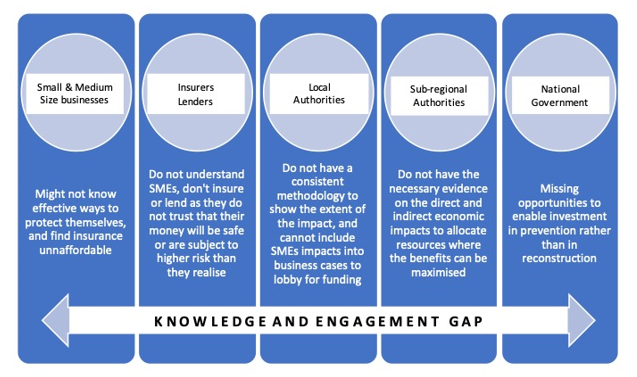The cost of the 2015 Boxing Days floods was £47M in Calderdale alone, and the indirect knock-on effects to the regional economy was £179M. This is just from one flood event. In every flood event there is the immediate damage, loss and destruction which is often highly visible; the knock-on effects which are wide-reaching and significant are not always so obvious. With climate change we are likely to experience more extreme weather events that can lead to flooding, so we need to improve our resilience across society.
The Small and Medium Enterprise (SME) sector can be highly vulnerable to flood impacts. Because a large proportion of the private sector is made up of SMEs – about 99% of Yorkshire’s private sector is made up of SMEs – flooding can have a massive impact across the wider region reaching areas outside those that were flooded.
Our newest iCASP project seeks to address this issue through supporting the SME sector to become more resilient to the impacts of flooding so the negative impacts on the wider economy are reduced.
Currently there is a large knowledge gap about the impacts of flooding upon SME businesses; this lack of knowledge extends from the SMEs themselves, through insurers and lenders, local and sub-regional authorities to national government. The effect of this knowledge gap can mean SMEs not understanding how to protect themselves adequately, and insurers or lenders not understanding the risks and so not providing lending or insurance. At the government level this lack of knowledge can manifest as a lack of appropriate funding being included in businesses cases and missed opportunities for evidenced resource allocation and investment in preventive measures.

This project will bring together local authorities and the insurance sector to help them improve their understanding of the impacts of flooding upon SMEs, identify how they can support the sector to become better prepared for floods and help prioritise their responses if and when flooding occurs. A key aspect of the project will be a robust methodology that can be used to assess the direct and indirect costs of flooding. This will enable local authorities (LAs) to carry out future flood assessments and subsequently develop evidenced and robust business plans for funding to support better responses for any future flooding.
“The Leeds City Region Flood Review was published in 2016 and developed in partnership between West Yorkshire Combined Authority/LEP, local authorities, Yorkshire Water and the Environment Agency. The Review and its 19 recommendations aim to implement a more consistent and effective approach to both flood risk management and mitigation, and responding to future flood events across the City Region. Recommendation 3 of the Review relates directly to this project as it confirms the urgent need for a robust regional formula for modelling the indirect economic impact of flooding”.
Regional Authority
The ability of lenders and insurers to accurately assess and understand the likely risks of flooding will enable them to understand the right level of risk, develop new products and properly price the current products unlocking access to them for SMEs who may currently be unable to do so. An improved understanding of the effectiveness of different protection and resilience measures could also boost an increase in lending for preventive purposes and thus better uptake of these important measures to improve resilience.
“The work package on insurance will cover an important gap as it provides valuable information to insurers/lenders and surveyors to increase our understanding of SME flood risk. When I hold my regular meetings with insurers, they are bought into the concept of resilience, but cannot move forward meaningfully to acknowledge it without more information and evidence. They want to understand from SMEs what is the real financial impact of a flood. But also, what difference in financial terms has, or could, a resilient strategy make to the cost of the claim. The tool that the project will co-create to assess the effectiveness of resilience measures will be key to identifying the most beneficial strategies SMEs can take to protect themselves”.
Insurance broker specialising in flood risk
As with all iCASP projects this has been co-designed and will be carried out in close collaboration with partners and stakeholders. Co-creation ensures efforts are joined-up to support widespread uptake in the Yorkshire region, and nationally, to spread the benefits of closing this current gap in our knowledge. This exciting new project will push the limits of our understanding on the economic impacts of flooding on SMEs and the effectiveness of property flood resilience measures. And, in collaboration with the City of York Pathfinder project “Yorkshire Future Flood Resilience”, it will work to improve the uptake of Property Flood Resilience across Yorkshire and the UK.
